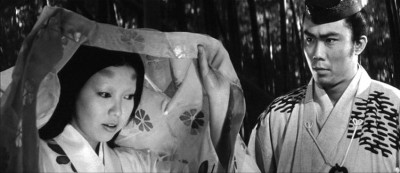
Kuroneko is a film that I wanted to like more than I did. This follow-up horror picture to Kaneto Shindo’s Onibaba (1964) has so many brilliant things in it and looks so good that it just ought to be better than it is. It’s a fairly traditional Japanese ghost story — though these ghosts are also vampires and maybe cats — that works on the basis that a raped and murdered woman and her daughter-in-law return from the dead to seek vengeance on the group of samurai responsible for their deaths. (Actually, the duo have expanded their wrath to include any and all samurai.) The concept is fine — as is the film’s thematic concerns over the way women are treated in the society it depicts — but Shindo develops it in an often clunky manner. Once he establishes the premise, he just keeps repeating the process of the ghosts trapping and disposing of their victims with very little alteration. The daughter waylays the victims, brings them home to mother, seduces them and kills them. (It doesn’t help that each and every target of their wrath is a boorish lout with no other character trait.) The worst of this is that the best of these attacks is the first one — in which we see that their supernaturally conjured house seems to float through its setting — so that all that follows is not only repetitive, it’s less interesting. The film does right itself when it gets to the central issue of what happens when their returning son/husband (now a samurai) is sent to destroy them, but too much damage has been done for these later sections to raise the film to the level of classic.
Classic World Cinema by Courtyard Gallery will present Kuroneko Friday, July 12, at 8 p.m. at Phil Mechanic Studios, 109 Roberts St., River Arts District (upstairs in the Railroad Library). Info: 273-3332, www.ashevillecourtyard.com.



Before you comment
The comments section is here to provide a platform for civil dialogue on the issues we face together as a local community. Xpress is committed to offering this platform for all voices, but when the tone of the discussion gets nasty or strays off topic, we believe many people choose not to participate. Xpress editors are determined to moderate comments to ensure a constructive interchange is maintained. All comments judged not to be in keeping with the spirit of civil discourse will be removed and repeat violators will be banned. See here for our terms of service. Thank you for being part of this effort to promote respectful discussion.